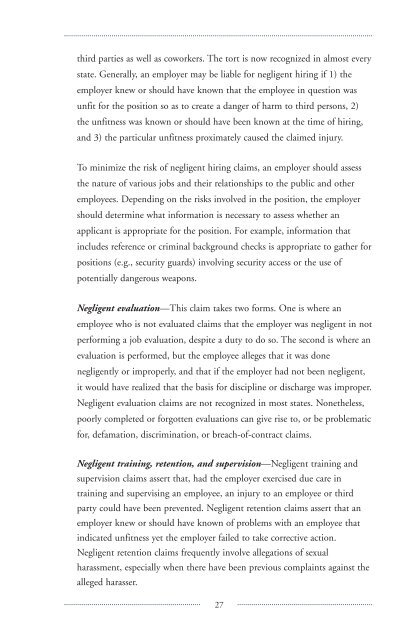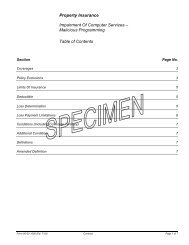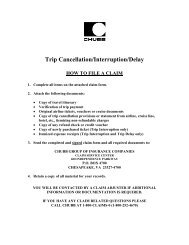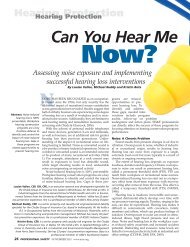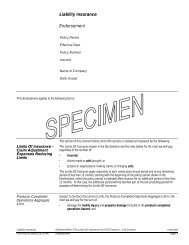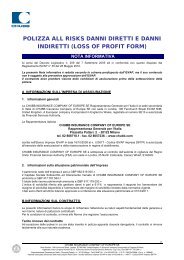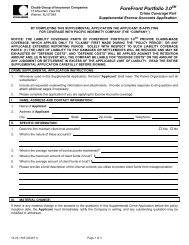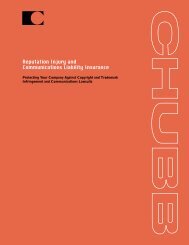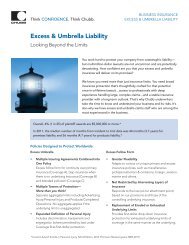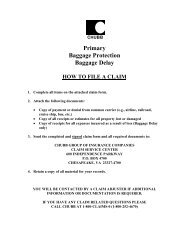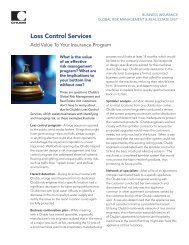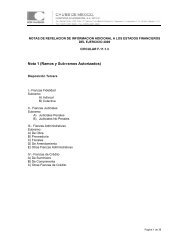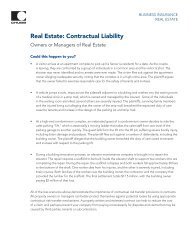Employment Practices Loss Prevention Guidelines - Chubb Group of ...
Employment Practices Loss Prevention Guidelines - Chubb Group of ...
Employment Practices Loss Prevention Guidelines - Chubb Group of ...
You also want an ePaper? Increase the reach of your titles
YUMPU automatically turns print PDFs into web optimized ePapers that Google loves.
third parties as well as coworkers. The tort is now recognized in almost every<br />
state. Generally, an employer may be liable for negligent hiring if 1) the<br />
employer knew or should have known that the employee in question was<br />
unfit for the position so as to create a danger <strong>of</strong> harm to third persons, 2)<br />
the unfitness was known or should have been known at the time <strong>of</strong> hiring,<br />
and 3) the particular unfitness proximately caused the claimed injury.<br />
To minimize the risk <strong>of</strong> negligent hiring claims, an employer should assess<br />
the nature <strong>of</strong> various jobs and their relationships to the public and other<br />
employees. Depending on the risks involved in the position, the employer<br />
should determine what information is necessary to assess whether an<br />
applicant is appropriate for the position. For example, information that<br />
includes reference or criminal background checks is appropriate to gather for<br />
positions (e.g., security guards) involving security access or the use <strong>of</strong><br />
potentially dangerous weapons.<br />
Negligent evaluation—This claim takes two forms. One is where an<br />
employee who is not evaluated claims that the employer was negligent in not<br />
performing a job evaluation, despite a duty to do so. The second is where an<br />
evaluation is performed, but the employee alleges that it was done<br />
negligently or improperly, and that if the employer had not been negligent,<br />
it would have realized that the basis for discipline or discharge was improper.<br />
Negligent evaluation claims are not recognized in most states. Nonetheless,<br />
poorly completed or forgotten evaluations can give rise to, or be problematic<br />
for, defamation, discrimination, or breach-<strong>of</strong>-contract claims.<br />
Negligent training, retention, and supervision—Negligent training and<br />
supervision claims assert that, had the employer exercised due care in<br />
training and supervising an employee, an injury to an employee or third<br />
party could have been prevented. Negligent retention claims assert that an<br />
employer knew or should have known <strong>of</strong> problems with an employee that<br />
indicated unfitness yet the employer failed to take corrective action.<br />
Negligent retention claims frequently involve allegations <strong>of</strong> sexual<br />
harassment, especially when there have been previous complaints against the<br />
alleged harasser.<br />
27


